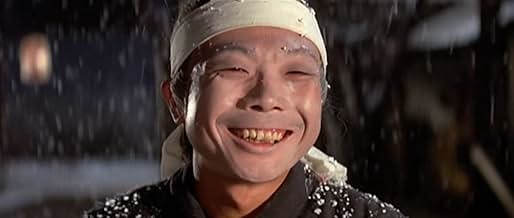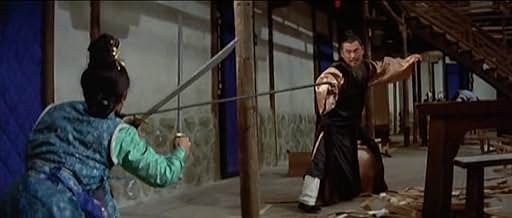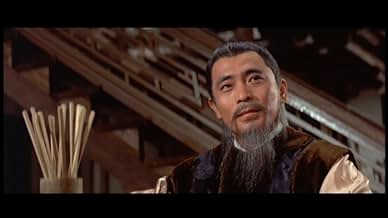Adicionar um enredo no seu idiomaThis sword-filled thriller centers on the title location-an inn where the down and dirty meet to plot nefarious doings.This sword-filled thriller centers on the title location-an inn where the down and dirty meet to plot nefarious doings.This sword-filled thriller centers on the title location-an inn where the down and dirty meet to plot nefarious doings.
- Direção
- Roteirista
- Artistas
Enredo
Avaliação em destaque
In BLACK TAVERN (1972), Ku Feng plays the pivotal role of Zheng Shoushan, the "Whip Master" and leader of a robbery band that takes over a remote inn, killing the brigands who already run it, to lay in wait for a traveling official who is newly retired and supposedly laden with treasure. In the course of it, he has to fend off numerous other miscreants drawn to the inn for the same purpose and must contend first with a mysterious lone swordsman (Kang Hua) who becomes an ally and then with a mysterious swordswoman (Shih Szu) whose agenda is initially unclear. Ku plays a truly charismatic bad guy here, to the point where we root for him and his gang for much of the film, especially as they kill off assorted other villains. He's pretty ferocious and uses his whip in some creative ways, including a sudden decapitation. Eventually, the official (Yang Chih-Ching) and his party arrive and some surprise defenders emerge and all hell breaks loose. In addition to all the fight scenes, it's fun watching the Whip Master and his crew take on the roles of obsequious inn employees to lull the visiting official and his party, all while switching into lethal force mode when such colorful bandit gangs as "the Three-Headed Cobra" and "the Five Ghosts of Xiang Xi" show up with ill intent. The excitement never lets up.
Also worth noting is the second lead, Kang Hua (aka Li Tung), a tall, dark, intense-looking actor who plays the lone swordsman who appears early and gains the Whip Master's confidence, setting the stage for some later action. He proves quite a capable screen fighter and is given ample opportunity to show what a top-notch swordplay star he could have been had he won more parts like this. (I hadn't heard of him before seeing this, even though I've seen some of the films he's listed in.) Shih Szu is superb in her portion of the film and has an extended duel with Ku Feng in the final 15 minutes. It's quite a grueling battle and she gives as good as she gets and demonstrates why she was considered a successor to Cheng Pei Pei, Shaw's leading female action star in the late 1960s, who had left Shaw Bros. for Golden Harvest around this time. The dialogue even refers to "Lady Hermit," a character Cheng played in the 1971 film THE LADY HERMIT, also reviewed on this site, which co-starred Shih Szu as her student. Shih is evidently playing that character here.
Yet it's Ku Feng who dominates BLACK TAVERN for most of its running time. There are numerous closeups of him where a narrowing of the eyes, an arching of an eyebrow, or a slight smirk convey enough key information to make dialogue completely unnecessary. Granted, the film is essentially an action-oriented variation on King Hu's DRAGON INN (1967) and not a classic Chang Cheh "heroic bloodshed" battlefest, but if you like this kind of film enough to seek out reviews like this one, you won't be disappointed. I must also add that the fight scenes were directed by Simon Hsu, one of Shaw's most inventive action choreographers, and he makes ample use of every space provided by the inn where the bulk of the film takes place and every prop contained therein. He specialized in scenes where multiple combatants engage each other on different planes and in different spaces, sometimes all in the same shot in real time, so there are few shortcuts or cheat shots. And there are lots of fight scenes here, so the cast members and stunt crew were kept pretty busy.
Also worth noting is the second lead, Kang Hua (aka Li Tung), a tall, dark, intense-looking actor who plays the lone swordsman who appears early and gains the Whip Master's confidence, setting the stage for some later action. He proves quite a capable screen fighter and is given ample opportunity to show what a top-notch swordplay star he could have been had he won more parts like this. (I hadn't heard of him before seeing this, even though I've seen some of the films he's listed in.) Shih Szu is superb in her portion of the film and has an extended duel with Ku Feng in the final 15 minutes. It's quite a grueling battle and she gives as good as she gets and demonstrates why she was considered a successor to Cheng Pei Pei, Shaw's leading female action star in the late 1960s, who had left Shaw Bros. for Golden Harvest around this time. The dialogue even refers to "Lady Hermit," a character Cheng played in the 1971 film THE LADY HERMIT, also reviewed on this site, which co-starred Shih Szu as her student. Shih is evidently playing that character here.
Yet it's Ku Feng who dominates BLACK TAVERN for most of its running time. There are numerous closeups of him where a narrowing of the eyes, an arching of an eyebrow, or a slight smirk convey enough key information to make dialogue completely unnecessary. Granted, the film is essentially an action-oriented variation on King Hu's DRAGON INN (1967) and not a classic Chang Cheh "heroic bloodshed" battlefest, but if you like this kind of film enough to seek out reviews like this one, you won't be disappointed. I must also add that the fight scenes were directed by Simon Hsu, one of Shaw's most inventive action choreographers, and he makes ample use of every space provided by the inn where the bulk of the film takes place and every prop contained therein. He specialized in scenes where multiple combatants engage each other on different planes and in different spaces, sometimes all in the same shot in real time, so there are few shortcuts or cheat shots. And there are lots of fight scenes here, so the cast members and stunt crew were kept pretty busy.
- BrianDanaCamp
- 11 de ago. de 2007
- Link permanente
Principais escolhas
Faça login para avaliar e ver a lista de recomendações personalizadas
Detalhes
- Tempo de duração1 hora 27 minutos
- Cor
- Proporção
- 2.35 : 1
Contribua para esta página
Sugerir uma alteração ou adicionar conteúdo ausente

Principal brecha
By what name was A Taverna Negra (1972) officially released in Canada in English?
Responda


























